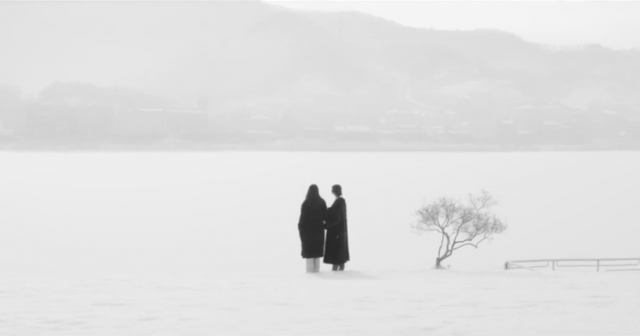AFI Fest 2018: Hotel by the River, by Scott Nye
It’s nothing but love among Hong Sang-soo fans, but I have noticed at least two factions of sorts crop up in the seven years I’ve been keeping up with his work. The first prizes most his rigidly-structured, more grounded features (like Right Now, Wrong Then; Hill of Freedom; and The Day After), while the second has a great appetite for his more overtly surreal, free-associative films (Yourself and Yours, Nobody’s Daughter Haewon, and On the Beach at Night Alone, for example). His latest, Hotel by the River, will give both sides much to celebrate and discuss, and may even find him some new fans along the way.
Ko Young-wan (Ki Joo-bong) is a celebrated poet, taking advantage of an admirer’s offer to stay for free at his pleasant hotel situated on the scenic, frozen Han River. He has called his sons, Byung-soo (Yu Jan-sang) and Kyung-soo (Kwon Hae-hyo), there to join him because, for no reason at all, he feels he is going to die. Meanwhile, a few rooms down, Sang-hee (Kim Min-hee) is also using the hotel to work through some depression, hers stemming from a recent break-up and a mysterious burn on her hand. She, too, has called someone to be with her, a woman (Song Seon-mi) who may be her sister or merely a close friend. They spend most of their time nodding in and out of sleep. Young-wan spends most of his looking for his sons, who are always much closer by than either expects.
Shot in striking black-and-white by Hyung-ku Kim, the frozen scenery is exploited for its whiteness, a detail-less landscape that places the characters in a sort of void. Absurd amounts of snow seem to fall during quick naps – as always, Hong incorporates the world into his films, letting its surprises yield dream-like results. In the film’s most striking image, Sang-hee and her visitor, clothed all in black, stand amidst a setting where land, water, and sky are near-indistinguishable, only a stray tree and the amorphous hillside helping break up the blank sheet of paper. The sight is so touching, it spurs Young-wan out of his own nap and outside to remark to the women how beautiful they are walking in the snow like that. Fortunately, they know and enjoy his work (reputation is often the only thing that saves men from themselves in Hong’s films), so after some initial fear, they accept his compliments and unspecified invitation to have drinks later on.
Young-wan is divorced (he’s told his ex-wife considers him “a total monster”), as is eldest son Kyung-soo. Byung-soo is too afraid of women to date much, though as a film director, he has at least two admirers nearby in the hotel desk clerk and Sang-hee’s friend. Much of Hong’s work explores the difficult dynamic between men and women, the struggle to truly connect at just the right moments. Hotel casts these five (six, including the desk clerk) as uniquely lonely, only the two main women in total synchronization – they seem to always desire the same activity, the same meal, the same thoughts. Hong has increasingly viewed this closeness among women with fondness, even jealousy. Nearly every other male director would at least acknowledge the possibility of sexual connection with two women lying in bed, hugging, but Hong treats it as women do, as bonding and an expression of platonic love.
The men, of course, have an impossible time making ends meet. Byung-soo is much younger than Kyung-soo, and so idolizes his father more; he walking out on both of them, but Kyung-soo was old enough at the time to see why and miss him less. None of them truly manage to say what they want to, stuck in cycles of pride and sudden declarations that seem far out of place, ruined by drunkenness and shouting. The brief time they do find to bond comes about entirely by accident, when Young-wan is eager to send them away but feels he needs to get them a gift. In some mixture of desperation and an inability to recognize how his sons have grown, he gives them a pair of stuffed animals he had lying around, insisting each represents one of them, not knowing how touched they’d be by this very strange gesture. They might squander the moment later, but it hangs over the film very sweetly, lending the rest of it an air of sincerity, even nostalgia, that Hong typically resists.
Small moments scattered throughout – a stray cat that wanders through a newly-abandoned frame, Young-wan’s delight at splitting a log with an axe or finding a couple dogs to pet – further emphasize the film’s affection for life’s little surprises that awakens our senses and re-integrate us with a world we so often feel distanced from. The film is, quite unusually for Hong, shot mostly handheld, further emphasizing the way such moments stray the instant they’re lived. Where the characters go after the hotel is as much a mystery as life after death, and Hong ends with an abstraction that still doesn’t flirt with cheap ambiguity. It can be tempting, even from the outset, to read this hotel, this winter, these people, as a sort of purgatory, and my own attraction to purgatorial cinema is certainly beckoning me to do so. But wherever they are, these five have managed to remind themselves of love.





























